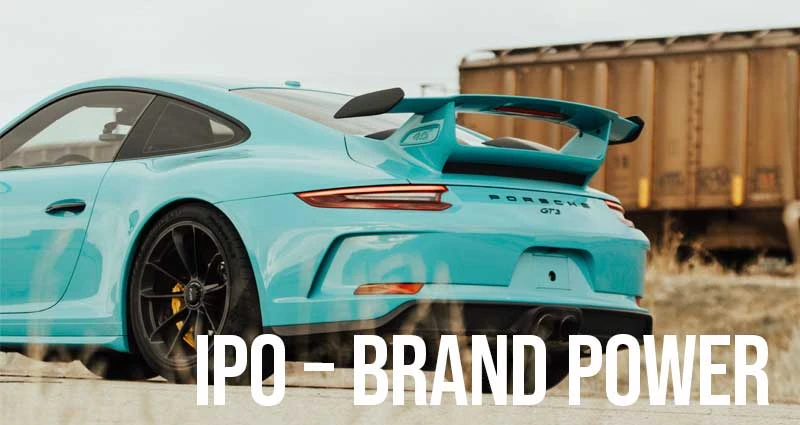The initial public offering (IPO) of Porsche AG occurred on Thursday 29th September and it was Europe’s largest initial public offering (IPO) of all time. Despite the market experiencing high volatility and Germany having high inflation figures, Porsche decided to continue with their Frankfurt listing and raised EUR9.4 billion in at a EUR78.5 billion valuation with shares being priced at the top end of the EUR76.50 to EUR82.50 range During 2021, Porsche recorded €33.1bn revenue and 24.5% EBITDA margin. Halfway through 2022, the firm is enjoying €17.9bn in revenue, up from €16.5bn in the year prior.
Porsche’s listing arose during a time when European flotations have faced their slowest year since 2009, with many investors concerned about potential global recessions on rising prices, higher interest rates and the Ukraine-Russia war, which is massively disrupting supply chains.
The key reason for doing an IPO now is that Volkswagen needs cash. Porsche is notoriously profitable and produce margins of 15%. Porsche accounted for just 3.5% of all the deliveries made by Volkswagen in 2021 but the brand generated 12% of the company’s overall revenue and 26% of its operating profit. This is despite Volkswagen being made up of an array of brands spanning everyday names like Skoda to premium brands like Lamborghini, Ducati, Audi and Bentley.
Porsches strong brand equity within the automobile market allows the business to add a premium to its share price. This is demonstrated by the fact HSBC analysts were expecting Porsche AG to be valued at EUR44 to EUR55 billion rather than the eventual EUR78.5 billion. With its heritage and impressive performance over a number of decades, Porsche is benefiting hugely from its brand value and equity.
Overview
Porsche AG is owned by Volkswagen Group. Volkswagen acquired a 49.9% stake in Porsche AG in 2009 before acquiring the rest of the business in 2012. Interestingly, Volkswagen is operated by an entity called Porsche Automobil Holding SE (Porsche SE), who retains a 31% stake in the business but dominates the voting rights within the company, thus controlling its future. Porsche SE, solely owned by the Porsche and Piëch families, does have some preference shares which are owned by foreign institutional investors and German-based private investors but hold no power in the decision making of Porsche SE.
Volkswagen has said it plans to divide the stock of Porsche AG into 50 % ordinary shares and 50% preference shares. Up to 25% of the preference shares will be listed as part of the IPO, which would mean just 12.5% of its total shares will be floated. The ordinary shares will have voting rights whereas the preference shares will not. The ordinary shares will not be listed and will remain in the hands of Volkswagen, meaning it will remain the controlling shareholder after Porsche AG is listed and continue to be consolidated into its own financial statements. However, Porsche SE, who owns the controlled steak in Volkswagen, will buy just over 25% of the ordinary shares in Porsche AG at a 7.5% premium to the eventual IPO price. This is important as any interested investors must understand that Porsche AG will remain firmly under the control of both Volkswagen and Porsche SE and that its free float will only include a fraction of its overall shares and offer no voting rights. This will make it difficult for any investor to build a significant stake in the business or push for change. This usually discourages institutional investors, as was the case with similar power imbalances at the IPO launches of THG and Deliveroo. Conversely, retail investors with confidence in the business may be able to purchase shares at a relative discount if there is weakened demand.
The Porsche aims and objectives are clearly set out in ‘Porsche Strategy 2030,’ which points to the move towards electric vehicles (EV) and even autonomous driving. One central issue will involve its transition to EVs; while 25% of the cars it sold last year were electric, the company also plans to offer internal combustion engine (ICE) cars for the foreseeable future as well.
This transition will need to be carefully managed so that Porsche can maintain its industry-leading profit margins while also keeping its heritage, a unique selling point against competitors ranging from German SUV makers like BMW and Mercedes, to luxury car manufacturers like Ferrari and McLaren.
Champions UK Plc specialise in transformational change to aid in reshaping business strategy, processes and communications. A well-defined approach for change can boost growth and efficiency through the utilisation of new technology and structures. Champions can assist in the implementation of a transformational change as a consultative partner working hand in hard for the duration of the journey.
Famously, other car manufactures have undergone IPO’s with varying levels of success:
Since its IPO in 2010, Tesla has become the world’s sixth most valuable company, with a market cap of $1.1 trillion.
Ferrari underwent an IPO in 2015 and it now has an enterprise value 22 times its earnings. To put that into perspective, VW’s is only double. Porsche also has consistently high profits and massive brand equity.
Aston Martin’s 2018 IPO was an attempt to replicate Ferrari’s. However, Aston’s market cap has slumped from an initial £4bn to just over £1bn since the IPO.
Power of the Porsche Brand and Legacy
The total valuation for Porsche AG was largely a surprise to many who predicted that the value would lie around EUR50 billion. The overvaluation of the firm demonstrates the power of the brand that Porsche AG wields. This is particularly noticeable as the valuation of EUR78.5 billion is only EUR3 billion shy of the value of the owner Volkswagen.
Porsche AG is the jewel in the crown of Volkswagen’s brand portfolio. While the Porsche and Piëch families’ determination to maintain control may dissuade some institutional investors, others may see the IPO as the only chance to acquire shares. Some investors will want to own shares in an iconic brand simply for the emotional value of owning a piece of heritage. Porsche’s massive brand equity and the relative scarcity of the shares should drive their value up.
According to Brand Finance, a leading brand value and equity consultancy, in 2021, Porsche lead the way as the most valuable Luxury and Premium brand. This study includes businesses of all industries not just the automobile market which goes to show the value the Porsche brand name carries.
This demonstrates that having a strong brand equity and heritage allows share price and valuation of the business to increase due to the perception of quality and uniqueness.
Evaluating and Maximising Capital Value Through Brand
Branded products have a dominant market share and gain brand loyalty from its users. A strong brand adds value by allowing firms to charge a higher price, thus increasing its margin as customers perceive the product to be superior. This works in both the B2B and B2C arenas. In January 2019, Coca Cola completed its £3.9 Billion acquisition of Costa Coffee from Whitbread. Credit Suisse had previously valued Costa and its assets at £2.5 Billion, however the actual total of almost £4 Billion represents a multiple of 16.4x FY 18 EBITDA. Costa’s brand strength and international presence caused Coca Cola to pay a premium of £1.4 Billion for the Costa brand.
It’s not uncommon to see investors target the stock of companies they are familiar with. Often these companies have a large brand equity. Investing firms or private investors often wish to understand the value, awareness and loyalty held by the potential investments brand and due diligence into the firm’s market, competitors and branding allows for a more complete picture of the undertaking required to receive a good ROI. Furthermore, businesses must utilise a strong value creation strategy to ensure the maximisation of capital value and brand equity.
For a thorough investment due diligence into brand or value creation plans to build brand equity, contact Champions UK Plc.

